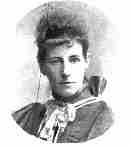
Alice Oldham
Courtesy Alexandra
College, Dublin
The Intermediate Board found itself in financial difficulties in 1881 and decided that girls should now be prepared to compete on terms of real equality with boys or, if they refused this, to have a special programme for girls who wished to compete among themselves for prizes and monetary rewards.
Alexandra College at once became the focal point of a new organisation, founded in 1882 to look after the interests of girls at both secondary and university level. This new organisation was called the Central Association of Irish Schoolmistresses (CAISM) and the dynamic Alice Oldham became its honorary secretary. Although it represented seventy Protestant girls' schools it soon became the major voice for the reform of girls' education in Ireland in the latter years of the nineteenth century, as convent schools were not allowed to join any such association at this time.

Alice Oldham
Courtesy Alexandra
College, Dublin
CAISM wanted to retain the original system for girls which would allow them to compete among themselves for the valuable money prizes, but to retain the right of girls to take the more difficult subjects such as Mathematics, Latin and even Greek. This was mainly with the aim of enabling girls to take such subjects at university level and thus ultimately to raise the standard of girls' secondary education. For the twenty years from 1881-1901, the Intermediate Education Board tried under various guises to introduce a separate programme for girls that would drop Mathematics and Latin in favour of Modern Languages and Domestic Economy. This was known as Programme B as distinct from Programme A where girls would compete with boys for the regular examination subjects. Eventually in 1901 the idea was quietly dropped.
Slowly but surely attitudes began to change. A new-found confidence became apparent among the Catholic middle classes as newspapers published lists of prize-winning schools, which to everyone's surprise, showed Catholic boys competing most successfully with their better-endowed Protestant rivals. The Freeman's Journal in 1883 drew attention to the fact that Protestant girls' schools were winning prizes and exhibitions unchallenged and that many convent schools had withdrawn from the Intermediate examinations. This was largely due to the fact that a typical convent school programme was not suited to the demands of the Intermediate examinations as it emphasised Religious Education, English, Arithmetic, French, Use of Globes, Sacred and Profane History, Mythology, Drawing, Music, Dancing, Plain and Ornamental Needlework, instead of the more highly graded Classics and Mathematics.